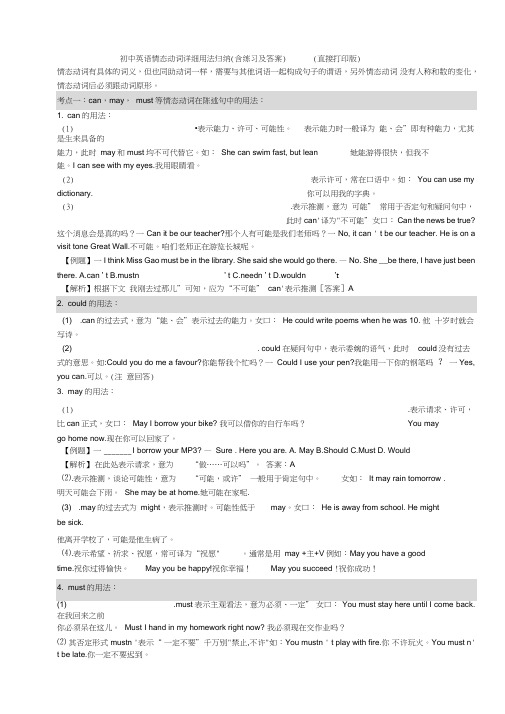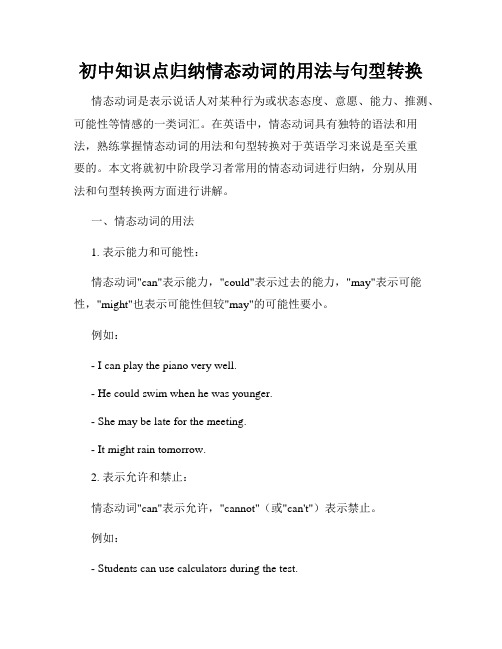初中情态动词用法总结
初中情态动词用法总结

初中情态动词用法总结情态动词(Modal Verbs)是英语中的一个重要的语法类别,用以表示说话人对其中一种动作或状态的态度、意愿、能力、推测等。
它在句子中一般与动词原形搭配使用,不变位,没有人称和数的变化。
以下是初中阶段常见的情态动词用法总结:1. can表示“能够”,一般用于表达个人的能力或技能。
例句:I can swim.(我会游泳。
)2. could表示“能够”,也可表示“曾经能够”,常用于过去时态。
例句:He could run very fast when he was young.(他年轻的时候跑得很快。
)3. may表示“可能”,用于表达推测、猜测或询问允许。
例句:It may rain tonight.(今晚可能会下雨。
)4. might表示“可能”,也可表示比may的可能性更小。
例句:She might be late for the meeting.(她可能会迟到会议。
)5. must表示“必须”,用于表示说话人的推断或肯定程度高的推测。
例句:You must finish your homework before going out.(你在出去之前必须完成作业。
)6. should表示“应该”,用于建议、命令或表示推测。
例句:You should eat more vegetables.(你应该多吃蔬菜。
)7. would表示“愿意”,用于表示说话人的意愿、请求或委婉的命令。
例句:Would you like a cup of tea?(你想要一杯茶吗?)8. will表示“愿意”,常用于表示请求或承诺。
例句:I will help you with your homework.(我会帮你做作业。
)这些是初中阶段常见的情态动词的用法总结,但实际使用中还会有更多的细微差异。
在学习和使用情态动词时,需要注意上下文和语境的区别,以及与其他词组的搭配。
(完整word版)初中英语情态动词详细用法归纳(含练习及答案)(直接打印版),推荐文档

初中英语情态动词详细用法归纳(含练习及答案) (直接打印版)情态动词有具体的词义,但也同助动词一样,需要与其他词语一起构成句子的谓语,另外情态动词没有人称和数的变化,情态动词后必须跟动词原形。
1. can的用法:(1)•表示能力、许可、可能性。
表示能力时一般译为能、会”即有种能力,尤其是生来具备的能力,此时may和must均不可代替它。
如:She can swim fast, but lean 她能游得很快,但我不能。
I can see with my eyes.我用眼睛看。
(2)表示许可,常在口语中。
如:You can use my dictionary. 你可以用我的字典。
(3).表示推测,意为可能” 常用于否定句和疑问句中,此时can'译为"不可能”女口:Can the news be true?这个消息会是真的吗?一Can it be our teacher?那个人有可能是我们老师吗?一No, it can ' t be our teacher. He is on a visit tone Great Wall.不可能。
咱们老师正在游览长城呢。
【例题】一I think Miss Gao must be in the library. She said she would go there. —No. She __be there, I have just beenthere. A.can ' t B.mustn ' t C.needn ' t D.wouldn 't【解析】根据下文我刚去过那儿”可知,应为“不可能” can'表示推测[答案]A(1) .can的过去式,意为“能、会”表示过去的能力。
女口:He could write poems when he was 10. 他十岁时就会写诗。
(2) . could在疑问句中,表示委婉的语气,此时could没有过去式的意思。
(完整版)初中情态动词用法总结

一情态动词的用法和辨析,情态动词表示推测和可能,由情态动词引导的一般疑问句的回答。
二 1 只是情态动词: can, could, may, might, must2 可做情态动词,可做实义动词: need, dare3 可做情态动词,可做助动词: will, would, shall, should4 特殊: have to, ought to, used to三 1 有一定的词义,但不能单独作谓语,必须与行为动词和系动词连用构成谓语。
2 无人称和数的变化。
( have to 除外)Eg: He has to stay here.3 后接动词原形。
4 具有助动词作用,可构成否定,疑问或简短回答。
四① 表示能力,“能,会”。
Eg : Can you play basketball?② 表示怀疑,猜测,常用于否定句或疑问句。
Eg :Li hua can’t be in the classroom.③ 表示请求,允许,多用于口语,译“可以”= may.Eg: youcangonow.④can 开头的疑问句,肯定句,否定句用 can 或 can’t.①can 的过去式,表示过去的能力。
Eg :I could swim when I was seven years old.②could 开头的疑问句,肯定和否定回答用 could, couldn’ t 如果 could 表示现在的委婉,用 can 回答。
Eg: Could I have a drink? Yes, you can.① 表示推测,“可能,也许”,用于肯定句。
Eg: He may come tomorrow.② 表示请求,“许可,可以”。
Eg: May I borrow your book?注:表示请求,许可时,主语为第一人称的一般疑问句,否定回答用 mustn’t“不可以,禁止,不许”,不用may not“可能不”。
③表示祝愿。
Eg :May you success.①表示“可以”,用于过去时中。
(完整版)初中英语情态动词用法大全

情态动词用法归纳情态动词有can (could), may (might), must, have to, shall (should, will (would), dare (dared), need (needed), ought to等。
情态动词无人称和数的变化;不能单独使用,必须与其后的动词原形构成谓语一、can, could1) 表示能力(体力、知识、技能)。
Can you lift this heavy box?(体力)Mry can speak three languages.(知识)Can you skate?(技能)此时可用be able to代替。
Can只有一般现在时和一般过去式;而be able to则有更多的时态。
I’ll not be able to come this afternoon.当表示“经过努力才得以做成功某事”时应用be able to,不能用Can。
如:He was able to go to the party yesterday evening in spite of the heavy rain.2) 表示请求和允许。
-----Can I go now?----- Yes, you can. / No, you can’t.此时可与may互换。
在疑问句中还可用could,might代替,不是过去式,只是语气更委婉,不能用于肯定句和答语中。
---- Could I come to see you tomorrow?---- Yes, you can. ( No, I’m afraid not. )3) 表示客观可能性(客观原因形成的能力)。
They’ve changed the time table, so we can go by bus instead.This hall can hold 500 people at least.4) 表示推测(惊讶、怀疑、不相信的态度),用于疑问句、否定句和感叹句中。
(完整版)初中情态动词用法总结(可编辑修改word版)

专项:情态动词一考点:情态动词的用法和辨析,情态动词表示推测和可能,由情态动词引导的一般疑问句的回答。
二类型:1 只是情态动词:can, could, may, might, must2 可做情态动词,可做实义动词:need, dare3 可做情态动词,可做助动词:will, would, shall, should4 特殊:have to, ought to, used to三特征:1 有一定的词义,但不能单独作谓语,必须与行为动词和系动词连用构成谓语。
2无人称和数的变化。
(have to 除外)Eg: He has to stay here.3后接动词原形。
4具有助动词作用,可构成否定,疑问或简短回答。
四用法:1.can ① 表示能力,“能,会”。
Eg : Can you play basketball?②表示怀疑,猜测,常用于否定句或疑问句。
Eg :Li hua can’t be in the classroom.③表示请求,允许,多用于口语,译“可以”= may.Eg: you can go now.④can 开头的疑问句,肯定句,否定句用can 或can’t.2.could ①can 的过去式,表示过去的能力。
Eg :I could swim when I was seven years old.②could 开头的疑问句,肯定和否定回答用could, couldn’t 如果could表示现在的委婉,用can 回答。
Eg: Could I have a drink? Yes, you can.3.may ① 表示推测,“可能,也许”,用于肯定句。
Eg: He may come tomorrow.②表示请求,“许可,可以”。
Eg: May I borrow your book?注:表示请求,许可时,主语为第一人称的一般疑问句,否定回答用mustn’t“不可以,禁止,不许”,不用may not“可能不”。
初中知识点归纳情态动词的用法与句型转换

初中知识点归纳情态动词的用法与句型转换情态动词是表示说话人对某种行为或状态态度、意愿、能力、推测、可能性等情感的一类词汇。
在英语中,情态动词具有独特的语法和用法,熟练掌握情态动词的用法和句型转换对于英语学习来说是至关重要的。
本文将就初中阶段学习者常用的情态动词进行归纳,分别从用法和句型转换两方面进行讲解。
一、情态动词的用法1. 表示能力和可能性:情态动词"can"表示能力,"could"表示过去的能力,"may"表示可能性,"might"也表示可能性但较"may"的可能性要小。
例如:- I can play the piano very well.- He could swim when he was younger.- She may be late for the meeting.- It might rain tomorrow.2. 表示允许和禁止:情态动词"can"表示允许,"cannot"(或"can't")表示禁止。
例如:- Students can use calculators during the test.- You can't smoke in this area.3. 表示建议和要求:情态动词"should"表示应该,"must"表示必须,"ought to"也表示应该。
例如:- You should study hard for the exam.- We must finish the project by tomorrow.- You ought to apologize for your behavior.4. 表示推测和可能性:情态动词"must"表示推测,表示"肯定","might"表示猜测,表示"可能"。
初中情态动词的用法总结知乎

情态动词(Modal Verbs)是一类用于表达说话人的意愿、能力、推测、请求、建议等情态的动词。
英语中常见的情态动词包括 can, could, may, might, will, would, shall, should, must 等。
以下是情态动词的用法总结:1. Can / Could:•能力:"Can" 表示一种具有能力或技能的能力,而"could" 表示过去的能力。
–I can swim.(我会游泳。
)–When I was younger, I could run very fast.(在我年轻的时候,我能跑得很快。
)•请求和允许: "Can" 和 "could" 可以用于请求和征求许可。
–Can I borrow your pen?(我能借用你的笔吗?)–Could I go to the bathroom, please?(我可以去洗手间吗?)2. May / Might:•请求和许可: "May" 和 "might" 也可用于请求和征求许可,尤其是在正式场合中。
–May I have a moment of your time?(我可以占用你一点时间吗?)–Might I suggest an alternative solution?(我可以提出一个替代方案吗?)•可能性和推测: "May" 和 "might" 用于表示可能性和推测。
–It may rain later.(可能会下雨。
)–She might be at home.(她可能在家。
)3. Will / Would:•意愿和承诺: "Will" 表示未来的意愿或承诺,而 "would" 通常用于表示过去或用于礼貌的请求。
初中情态动词用法总结.

初中情态动词用法总结一、can的用法:1. (表示能力、功能能,会The classroom can seat thirty students.这教室能坐三十位学生。
June can drive now.琼现在会开车了。
2. (表示可能性可能,可能会I think the work can be completed ahead of time. 我认为这项工作能提前完成。
3. (表示允许、请求可以You can't take the book out of the room.你不可以将这本书拿出室外。
Can I use your pen?我可以用一下你的笔吗?4. (表示命令必须If you won't keep quiet you can get out.你如不保持安静,就请你走。
5. (表示偶然发生的可能性有时会It can be quite windy there, especially in spring.那里有时容易刮风,特别在春季。
6. (表示惊讶究竟;竟至于What can it possibly be?到底那是怎么一回事?二、could的用法can的过去式;(用于虚拟语气,表示与事实相反的设想能;可以;(表示可能性可能;(用于婉转语气能,可以三、may的用法1.表示请求和允许,意思是:可以He may come if he likes. 如果他想来,可以来2.表示祝愿,意思是:祝…,(但愿。
May the friendship between our two peoples last forever. 祝两国人民的友谊万古长青。
3.表示推测,意思是:可能(会,或许(会。
It may rain this evening. You'd better take an umbrella. 今晚可能要下雨,你最好带上雨伞。
四、must的用法1.表“必须”。
You must talk to them about their study.你必须同他们谈谈关于他们学习的事。
- 1、下载文档前请自行甄别文档内容的完整性,平台不提供额外的编辑、内容补充、找答案等附加服务。
- 2、"仅部分预览"的文档,不可在线预览部分如存在完整性等问题,可反馈申请退款(可完整预览的文档不适用该条件!)。
- 3、如文档侵犯您的权益,请联系客服反馈,我们会尽快为您处理(人工客服工作时间:9:00-18:30)。
专项:情态动词一考点:情态动词的用法和辨析,情态动词表示推测和可能,由情态动词引导的一般疑问句的回答。
二类型:1 只是情态动词:can, could, may, might, must2 可做情态动词,可做实义动词:need, dare3 可做情态动词,可做助动词:will, would, shall, should4 特殊:have to, ought to, used to三特征:1 有一定的词义,但不能单独作谓语,必须与行为动词和系动词连用构成谓语。
2 无人称和数的变化。
(have to 除外)Eg: He has to stay here.3 后接动词原形。
4 具有助动词作用,可构成否定,疑问或简短回答。
四用法:1. can ①表示能力,“能,会”。
Eg : Can you play basketball?②表示怀疑,猜测,常用于否定句或疑问句。
Eg :Li hua can’t be in the classroom.③表示请求,允许,多用于口语,译“可以”= may.Eg: you can go now.④can 开头的疑问句,肯定句,否定句用can或can’t.2.could①can 的过去式,表示过去的能力。
Eg :I could swim when I was seven years old.②could 开头的疑问句,肯定和否定回答用could, couldn’t如果could表示现在的委婉,用can 回答。
Eg: Could I have a drink? Yes, you can.3.may①表示推测,“可能,也许”,用于肯定句。
Eg: He may come tomorrow.②表示请求,“许可,可以”。
Eg: May I borrow your book?注:表示请求,许可时,主语为第一人称的一般疑问句,否定回答用mustn’t“不可以,禁止,不许”,不用may not“可能不”。
③表示祝愿。
Eg :May you success.4.might①表示“可以”,用于过去时中。
Eg: He told me I might smoke in the room.②用于现在时,表示说话更委婉,礼貌。
Eg:He might be doing his lessons now.5.must①表示“必须,应该”。
②表示推测,常用在肯定句中,表“一定”。
Eg:There is someone knocking at the door.It must be Jim.③否定句中,mustn’t 表示禁止,“不允许”。
④以must 开头的疑问句,肯定句回答用must,否定回答用needn’t , 表示“不需要,不必”=“don’t have to”.⑤表示“偏偏”。
Eg: Must you play the piano at this time.6.need①情态动词:+do,用need 提问或回答,肯定句回答用must ,否定句回答用needn’t. Eg: You needn’t come to school so early.②实义动词:+to do ,用助动词提问和否定。
③+doing 表示被动。
④needn’t have done 表示没必要做某事但是做了。
Eg: I actually needn’t have bought so much wine.7.dare①情态动词,多用于疑问句,否定句,条件句中。
Eg: I’m afraid you dare not to do such a thing.注:I dare say 习惯说成“也许,我想”。
Eg: It will rain this afternoon, I dare say.②实义动词:dare to do ,用于肯定句中,当用于否定句或疑问句时,to 可以省略。
Eg: This student doesn’t dare to raise any question in class. 8.shall①用于第一人称表示征求意见,询问。
Eg: Shall I open the window?Shall we have lunch here?②表示说话人的态度,“命令,警告,允诺,威胁”。
Eg: You shall finish your homework first.③用于第三人称,在条约,规定,法令等文件中表示义务或规定,“应该,必须”。
(不常用)9.should①表示义务,责任“应该”。
Eg:We should obey traffic laws.②作为shall 过去式,用于第一三人称,表示征求意见。
Eg:Mr leeasked if he should get his visa.③表示“竟然”。
Eg: It’s unthinkable that the boy should sing such a beautiful song.④表示说话人的特殊情感,如惊奇,愤怒,失望等。
Eg: How should I know?⑤表示劝告,建议,“应该”。
Eg: You should listen to your teacher.10.will①用于第二人称表示询问,请求,也可以表达现在的“意愿”。
Eg: Will youpass me the book?②表示意愿,决定,允诺,用于各种人称。
Eg: I will try my best to help you.③表示规律性的“注定会”。
Eg: People will die without air or water.11.would①表示过去的意愿或委婉询问。
Eg: Would you tell me the way to the station?12.have to①“必须,不得不”,强调客观需要,含有时态的变化。
Eg: I’ll have to ask Jim instead.②区别:must 表示“必须,应该“,主观看法。
13.ought to ①表示职责,义务或要求,及人们应该去做的正确的事或好事。
Eg:Humans ought to stop polluting nature.②比should 语气强,ought to 反映客观情况,should表示主观看法。
③ought to have done 本应该做而没有做。
Eg: You are late. You ought to have arrived five minutes earlier. ed to①表示“过去常常,过去是“,没有人称和数的变化,可以和过去的时间状语连用。
否定形式:usedn’t to 或didn’t use to ,疑问词将use提前或Did…use to …?Eg: He didn’t use to be so careless.②区别would :带有主观性,并且现在做不做不知道。
Used to :客观性,和现在进行对比,过去常常,现在就不怎么做了。
Eg: He would phone me on Sunday.Eg: I used to be very fond of music when I was young.③区别:be used to doing (情态动词)习惯于…Used to do (情态动词)过去是,过去常常…Be used to do (过去式) 被用来做…Eg: I am already used to noisy city life here.My parents used to live in South America.This machine is used to cut up waste paper.15.其他:⑴had better do 最好做某事Eg: You had better stay at home.否定:had better not do⑵be able to与can 表示能力时用法相同,但前者有时态的变化,有能力成功做某事。
Eg: We will be able to come back next week.专题练习:1( ) 1 John___ come to see us tonight, but he isn't very sure yet.A. mayB. canC. has toD. must( ) 2 They ___ do well in the exam.A. can be able toB. be able toC. can able toD. are able to( ) 3 -May I take this book out?-No, you___. A. can't B. may not C. needn't D. aren’t( ) 4 You___ go and see a doctor at once because you're got a fever.A. canB. mustC. dareD. would( ) 5 -Can you speak Japanese?-No, I____. A. mustn't B. can't C. needn't D. may not2( ) 1 -He___ be in the classroom, I think.-No, he ___ be in the classroom. I saw him go home a minute ago.A. can; may notB. must; may notC. may; can'tD. may; mustn’t( ) 2 -Shall I get one more cake for you, Dad?-Thanks, but you___, I've had enough. A. may not B. must not C. can't D. needn’t ( ) 3 Even the top students in our class can't work out this problem, so it be very difficult. A. may B. must C. can D. need( ) 4 He isn't at school. I think he ___ be ill. A. can B. shall C. must D. has to ( ) 5 ___ I take this one? A. May B. Will C. Are D. Do3( ) 1 The children___ play football on the road. A. can't B. can C. mustn't D. must ( ) 2 You ___ be late for school again next time.A. mustn'tB. needn'tC. don't have toD. don't need to( ) 3 -Must I do my homework at once?-No, you___. A. needn't B. mustn't C. can't D. may not4( ) 1 His arm is all right. He___ go and see the doctor.A. has not toB. don't have toC. haven't toD. doesn't have to( ) 2 He had to give up the plan, ___ he? A. did B. didn't C. does D. doesn't( ) 3 They had to walk here, ___ they? A. mustn't B. did C. didn't D. hadn't5( ) 1 He had better stay here, ___ he? A. didn't B. don't C. hadn't D. isn't( ) 2 You'd better___late next time. A. not to be B. not be C. won't be D. don't be ( ) 3 You'd better ___ your hair ___ once a month.A. had; cutB. had; cuttedC. have; cutD. have; cutted( ) 4 You___ ask that man over there. Maybe he knows the way.A. had better not toB. had not betterC. had betterD. had better not6( ) 1 -Shall we go and visit the History Museum next Sunday?A. Here you areB. Sorry, I can'tC. Yes, pleaseD. Let me try( ) 2 -Why don't you ask Mike to go with us?-Thanks, ___. A. I will B. I won't C. lean D. I may( ) 3 -___ I take the newspaper away?-No, you mustn't. You____read it only here.A. Must; canB. May; canC. Need; mustD. Must; must7( ) 1 Excuse me. ___ you please pass me that cup?A. DoB. ShouldC. WouldD. Must( ) 2 ___ you like to have another try?A. CouldB. WillC. WouldD. Do( ) 3 -Would you like to go boating with us?-Yes, ___.A. I'd like B. I want C. I'd like to D. I do8( ) 1 You___ worry about your son. He will get well soon.A. needn'tB. can'tC. mustn'tD. have to( ) 2 The poor man needs our help, ___ he?A. needB. needn'tC. doesD. doesn't( ) 3 -Must we do our homework first?-No, you___. You may have a rest first.A. mustn'tB. needn'tC. may notD. can't。
